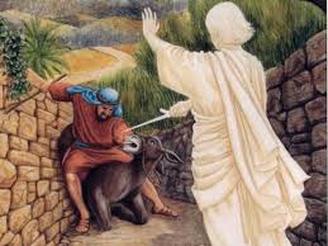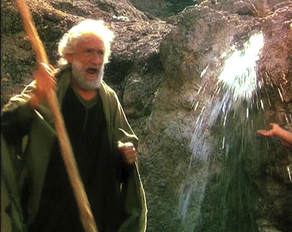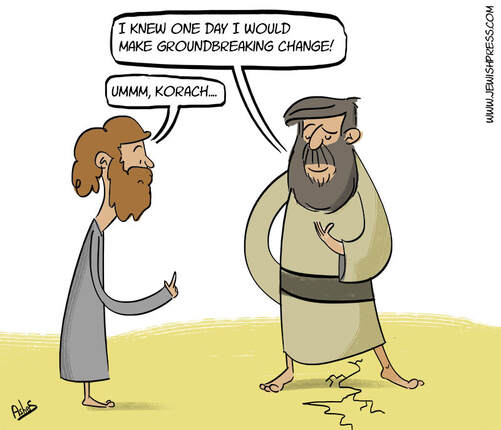
Therefore, please come, and curse this people for me, because they are stronger than I am. Maybe I will be able to strike them down and drive them out of the land, for I know that whomever you bless is in fact blessed, and whomever you curse is in fact cursed."
(Num 22:6 CJB)
We should pray that your enemies become our friends
* * * * * * *
The Chofetz Chayim had some things to say about this passage concerning Balak's decision to curse Israel. Here is what Balak believed concerning Balaam's powers, "... I know that whomever you bless is in fact blessed, and whomever you curse is in fact cursed." The Chofetz brings out the true antisemitic and violent nature of Balak by pointing out that according to what he believed were Balaam's powers, Balak had the choice to have Balaam either curse Israel, or bless his own people with protection.
We often are faced with similar choices and like Balak, naturally let our hatred and vindictive spirit dictate our response towards the destruction of others rather than the protection of our own. In doing so, we forget that they are also creatures of the Most-High.
Here is an anecdote to illustrate the point:
The non-Jews of the city of Telshe greatly respected Rabbi Eliezer Gordon, the Rabbi of Telshe and founder of its Yeshiva, and many of them would ask him to pray for their welfare. One a non-Jewish farmer came to Rabbi Gordon and asked him to pray that his enemy should die. Rabbi Gordon explained to him that the proper thing for him to do was not to curse his enemy, but to pray that his enemy become his friend. (Tnuas Hamusar, vol 2, p.433)
King David sang about this in,
תערך לפני שׁלחן נגד צררי
You prepare a table before me in the presence of my enemies;
(Psa 23:5 ESV)
His son, King Solomon followed suit in:
When a man's ways please Adonai,
he makes even the man's enemies be at peace with him.
(Pro 16:7 CJB)
This idea of a table set before one's enemy comes from Isaac, the patriarch. King Abimelech tried to steal Isaac's wells which he inherited from his father Abraham. When he realized that Isaac was truly the heir of Abraham and therefore the inheritor of the covenant made between his family than that of the belated patriarch, he repented. Abimelech then came to Isaac and wanted to act as if nothing had happened. He said,
"We saw very clearly that Adonai has been with you; so we said, 'Let there be an oath between us: let's make a pact between ourselves and you (29) that you will not harm us, just as we have not caused you offense but have done you nothing but good and sent you on your way in peace.
Now you are blessed by Adonai.' "
(What gall!) Isaac did not give vent to natural senses of indignation
(30) Yitz'chak prepared a banquet for them, and they ate and drank.
(Gen 26:28-30 CJB)
Instead of seeking revenge and vindication, Isaac set up a banquet in front Abimelech. The full story can be found in Genesis 26. Later, his father Jacob acted according to the same principle towards his brother Esau in Genesis 32 and 33. In doing so, the patriarchs of our faith followed in the footsteps of Abraham of whom we talked in a precedent newsletter.
It is according to these story which constitute the basic context and foundation of the Torah, that our own beloved rabbi and Master Yeshua also taught. He said,
"You have heard that our fathers were told, 'Love your neighbor -- and hate your enemy.' But I tell you, love your enemies! Pray for those who persecute you! Then you will become children of your Father in heaven. For he makes his sun shine on good and bad people alike, and he sends rain to the righteous and the unrighteous alike. What reward do you get if you love only those who love you? Why, even tax-collectors do that! And if you are friendly only to your friends, are you doing anything out of the ordinary? Even the Goyim do that! Therefore, be perfect, just as your Father in heaven is perfect.
(Mat 5:43-48 CJB)
Paul concurred in:
Till this very moment we go hungry and thirsty, we are dressed in rags, we are treated roughly, we wander from place to place, we exhaust ourselves working with our own hands for our living. When we are cursed, we keep on blessing; when we are persecuted, we go on putting up with it; when we are slandered, we continue making our appeal. We are the world's garbage, the scum of the earth -- yes, to this moment! ... Therefore I urge you to imitate me.
(1Co 4:11-16 CJB)
We all have those people in our lives with whom we have issues. We have them in our societal life with neighbors and friends: in our professional life at work; in our domestic life with flesh relatives, and even within our own congregations.
It is the belief of this writer that we need to fight those issues in our midst. They are like spots at our festive gatherings. (Jude 1;12)
- Congregation: We often cannot help negative situations to occur, but we have to not accept them and do everything we can to repair these breaches in our fellowship. The survival of the congregation depends on it; a little stone can break the whole windshield, and as the story goes, the loss of the nail, was the loss of the shoe, and the loss of the shoe became the loss of the horse which incurred the loss of the soldier, and in the end the loss of the battle. According to the Master as well as to Peter and to Paul, it is better to be wrongly accused and accept being defrauded rather than allow a breach in our fellowship. (Mat 5:10-11, 40; 1 Cor 6:7; 1 Pet 1:20
- Families: Paul teaches,
(Rom 11:16 CJB)
When we have been given the truth to receive, we become the firstfruit of our larger flesh relatives. By keeping them in close relations and doing everything we can to maintain relationships with them, we become the "challah" through which they are also given a foretaste of the Kingdom. This is a very important principle that I called, "No Redemption Without Representation" As He sent his disciples to all the families of Israel, the Master charged them with, "
Whoever receives you is receiving me, and whoever receives me is receiving the One who sent me. (Mat 10:40 CJB)
It becomes then absolutely imperative that we become 'receivable' to them. We cannot let trivial issues separate us. This transcends doctrinal rectitude and we have to juggles our sometimes different views on things while still keeping relations with relatives. We must remember that the Father took it upon Himself to repair the relationship with us, relationship that we have been responsible to break through our sin. He did that by sending Yeshua who had no sin to take our sins upon Himself. This is the very same Yeshua who charged us with,"
Just as the Father sent me, I myself am also sending you."
(Joh 20:21 CJB)
- Professional: At work there is usually much politics, competition, dislike of the boss, criticism. We are to show ourselves better by not participating in those things but keeping ourselves 'perfect, just as your Father in heaven is perfect. (Mat 5:48 CJB) . And as far as work ethics towards earthly bosses Paul gives the advice,
He also tells the disciples in Colossi,
Slaves, obey your human masters in everything, not serving only when they are watching you, to win their favor, but single-heartedly, fearing the Lord. (Col. 3:22)
The word "slave" here can refer to "employee". We must remember that Joseph, Daniel, Esther, and many others were asked to work under pagan kings. By being able to do in the Spirit of HaShem, they earned the love of their masters which helped them to deliver Israel from harm.
- Societal: The Master says,
To which Paul adds,
If you are bringing lawsuits against each other, it is already a defeat for you. Why not rather be wronged? Why not rather be cheated? (1Co 6:7 CJB)
In essence, it is better to be accused of wrong, even wrongfully, and keep the peace rather than to try to validate our rightness and have discord. Peter also agreed and said,
For what credit is there in bearing up under a beating you deserve for doing something wrong? But if you bear up under punishment, even though you have done what is right, God looks on it with favor. (1Pe 2:20 CJB).
I would like to complete this challenge to peace and unity with a little expose on the words in the Besora:
From that time on, Yeshua began making it clear to his talmidim that he had to go to Yerushalayim and endure much suffering at the hands of the elders, the head cohanim and the Torah-teachers; and that he had to be put to death; but that on the third day, he had to be raised to life. Kefa took him aside and began rebuking him, "Heaven be merciful, Lord! By no means will this happen to you!" But Yeshua turned his back on Kefa, saying, "Get behind me, Satan! You are an obstacle in my path, because your thinking is from a human perspective, not from God's perspective!" Then Yeshua told his talmidim, "If anyone wants to come after me, let him say 'No' to himself, take up his execution-stake, and keep following me. For whoever wants to save his own life will destroy it, but whoever destroys his life for my sake will find it. What good will it do someone if he gains the whole world but forfeits his life? Or, what can a person give in exchange for his life? For the Son of Man will come in his Father's glory, with his angels; and then he will repay everyone according to his conduct.(Mat 16:21-27 CJB)
In this passage, Yeshua warns His disciples that as He goes to Jerusalem, He will be wrongfully accused of sedition, blasphemy, etc, and that as a result He will be given the death penalty in the manner the worst criminal in the Land would receive. A very unjust punishment indeed that even cruel Pilate was reluctant to inflict on the Master. Peter tries to defend the Master who tells him, "You are an obstacle in my path."
By this the Master implies that this unjust death was his destiny, the purpose of his coming, and that this is the action that will repair our broken relationship with HaShem. This is a totally Jewish sentiment as the Talmud teaches that,
The death and suffering of the innocent righteous
provides atonement for the sinner.
After reminding Peter to not think as man thinks but as God thinks, the Master adds,"
If anyone wants to come after me, let him say 'No' to himself,
take up his execution-stake, and keep following me.
In essence, the 'execution-stake' He carried was taking upon Himself the sins of others through an execution under false accusations. He indeed suffered the wrongful death of an innocent victim.
In this challenge the Master says that anyone who wants to come after him needs to be willing to be wrongfully accused, to be defrauded, and become an innocent victim for the sake of the redemption of others. A very hard saying indeed, but an imperative for us who have become part of the Kingdom through following the path of Yeshua. That is is what it means when Yeshua says we need to take our execution-stake and follow Him.
MAY WE THEREFORE EACH OF US
TAKE UP OUR EXECUTION-STAKE
AND BE SENT TO OTHERS AS HE WAS SENT TO US.
THIS IS THE LEAST WE CAN DO.
REMEMBER THE PARABLE
OF THE UNFORGIVING SERVANT
Because of this, the Kingdom of Heaven may be compared with a king who decided to settle accounts with his deputies. Right away they brought forward a man who owed him many millions; and since he couldn't pay, his master ordered that he, his wife, his children and all his possessions be sold to pay the debt. But the servant fell down before him. 'Be patient with me,' he begged, 'and I will pay back everything.' So out of pity for him, the master let him go and forgave the debt. "But as that servant was leaving, he came upon one of his fellow servants who owed him some tiny sum. He grabbed him and began to choke him, crying, 'Pay back what you owe me!' His fellow servant fell before him and begged, 'Be patient with me, and I will pay you back.' But he refused; instead, he had him thrown in jail until he should repay the debt. When the other servants saw what had happened, they were extremely distressed; and they went and told their master everything that had taken place. Then the master summoned his servant and said, 'You wicked servant! I forgave you all that debt just because you begged me to do it. Shouldn't you have had pity on your fellow servant, just as I had pity on you?' And in anger his master turned him over to the jailers for punishment until he paid back everything he owed. This is how my heavenly Father will treat you, unless you each forgive your brother from your hearts." (Mat 18:23-35 CJB)
* * * * * *



 RSS Feed
RSS Feed